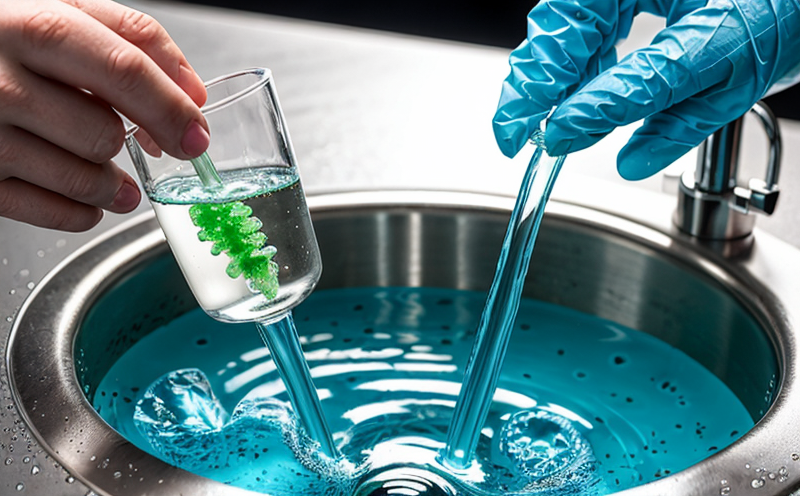ASTM D6975 Biofilm Formation Potential Test in Water
The ASTM D6975 biofilm formation potential test is a critical tool for the water and wastewater testing sector. This method evaluates the ability of microorganisms to form biofilms under specific conditions, which can lead to fouling, corrosion, and other issues within distribution systems.
Understanding biofilm formation in water systems is essential for maintaining infrastructure integrity and ensuring public health. Biofilms can harbor a wide variety of pathogens and serve as a breeding ground for bacteria, fungi, and other microorganisms that can pose risks to human health. By quantifying the potential for biofilm formation, this test helps identify early signs of fouling or contamination, allowing for targeted preventive measures.
The ASTM D6975 protocol is widely recognized in both the water treatment industry and research communities. It specifies a standardized procedure for incubating water samples to observe the development of biofilms on artificial surfaces such as polystyrene plates. The results provide insights into the microbial community composition, which can inform decisions about water quality management.
During the test, the biofilm formation potential is assessed by measuring biomass accumulation over time using optical density readings or other appropriate techniques. This data helps stakeholders make informed choices regarding treatment processes and materials selection to minimize the risk of biofilm-related problems in their systems.
| Parameter | Description |
|---|---|
| Biomass Accumulation | The amount of biomass developed on the test substrate over a specified period. |
| Optical Density | A measure of light scattering by microorganisms present in a sample. |
| Surface Area | The area of the artificial surface used for biofilm formation. |
| Incubation Time | The duration during which the water samples are incubated to allow biofilm development. |
This test is particularly valuable in sectors dealing with potable water, industrial cooling systems, and wastewater treatment plants. For instance, it can help identify areas where additional disinfection steps might be necessary or pinpoint specific materials that resist biofilm formation more effectively than others.
The ASTM D6975 protocol ensures consistency across different testing environments, making it a reliable method for comparing the performance of various water treatment systems and materials. This standardization is crucial given the diverse range of applications within the water industry where biofilm control plays a significant role in operational efficiency and safety.
Scope and Methodology
The ASTM D6975 test evaluates the potential for biofilm formation by exposing water samples to controlled conditions that favor microbial growth. The scope of this method includes assessing how different parameters influence biofilm development, such as temperature, nutrient availability, and specific chemical additives.
| Parameter | Value |
|---|---|
| Temperature | 20 ± 1 °C (68 ± 2 °F) |
| pH Level | Neutral to slightly alkaline, adjusted as necessary |
| Nutrient Content | Defined nutrient media to support microbial growth |
The test involves inoculating water samples with a standardized suspension of microorganisms and placing them on artificial surfaces. These surfaces are then incubated under controlled conditions for an extended period, typically ranging from one week to several weeks.
During the incubation phase, the formation of biofilms is monitored through visual inspection and quantification techniques like optical density measurements or biomass assays. The results provide valuable data on the rate and extent of biofilm development, helping researchers and engineers refine their approaches to biofilm management.
Benefits
- Predictive insights into potential biofilm issues in water systems.
- Assists in selecting materials that are resistant to biofilm formation.
- Aids in optimizing disinfection protocols and treatment processes.
- Supports compliance with regulatory requirements for water quality management.
- Facilitates early detection of biofilm-related problems, enhancing system reliability.
- Enables the development of more effective cleaning agents and methods.
The ASTM D6975 test is a cornerstone in the field of microbiological water testing. Its ability to provide detailed information on biofilm formation potential makes it an indispensable tool for quality managers, compliance officers, R&D engineers, and procurement professionals involved in water treatment and distribution.
Why Choose This Test
The ASTM D6975 biofilm formation potential test is chosen by many because it offers a comprehensive approach to understanding the microbiological aspects of water systems. By providing precise measurements and standardized conditions, this method ensures accurate and reliable results.
One of the key advantages of using ASTM D6975 lies in its ability to identify early signs of biofilm formation. This allows for proactive measures that can prevent more severe issues down the line. For instance, if a particular material or treatment process is found to promote higher levels of biofilm development, adjustments can be made before significant fouling occurs.
Additionally, this test supports regulatory compliance by aligning with international standards such as ASTM D6975 itself and other relevant guidelines in the water sector. This ensures that any decisions based on these tests are consistent with industry best practices and legal requirements.
The flexibility of the ASTM D6975 protocol also makes it suitable for various applications within different sectors, including potable water systems, industrial processes, and wastewater treatment plants. Its broad applicability means it can be adapted to suit specific needs across diverse operational environments.





